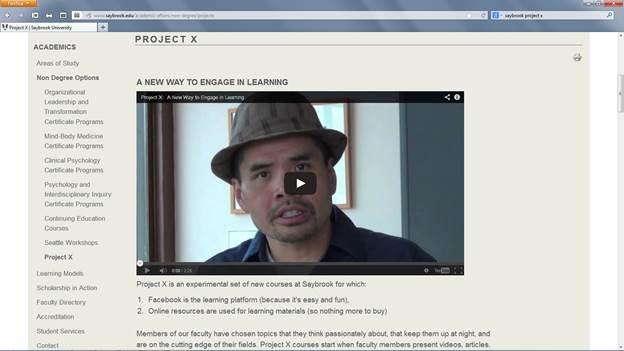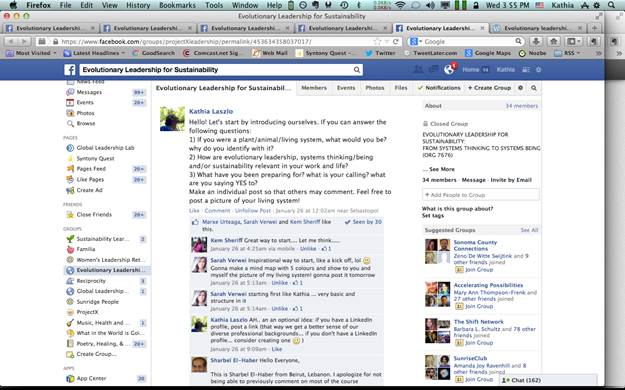Key Takeaways
- Inspired by a desire to make online courses more engaging for faculty and students, Saybrook University launched Project X, which offers experimental courses that use Facebook as the learning platform.
- Participating faculty members must meet two conditions: they must structure courses around a topic they are passionate about and use only freely available online course materials.
- Assignments, instructor comments, and student projects are shared on Facebook, inspiring further comments and discussions among course participants.
- The Facebook platform allows for unique interactions and relationships, and a different type of learning that is inherently collaborative and a function of the unique synergy of the group.
In January 2013, Saybrook University launched an experimental set of online graduate courses that used Facebook as the learning management system. The idea came to me while commuting to work on San Francisco's rail transit system; I was trying to come up with a way to make online learning more relevant and interactive for our students and online teaching more engaging and fun for our faculty. As I looked around the train car, I saw that most people, of all ages and stripes, had their faces buried in some personal digital device and half of them were on Facebook. Eureka! What student wouldn't want to hang out on Facebook and get academic credit for it? What faculty members wouldn't enjoy the spontaneity of instantly posting a link for students to a TED talk they had just fortuitously discovered?
Planning the Facebook Experiment
Traditionally, our online courses have had a one-on-one mentor option in which a student is the only one in a course with the instructor. Because this is not the most fiscally efficient pedagogical format, we wanted to experiment with a platform that was designed specifically to provide a forum for many participants. We also thought that using Facebook with some courses would generate good publicity, provide currency with the tech-savvy, and draw the attention of new audiences.
In addition to increasing faculty and student engagement, we had two additional goals for our Facebook courses:
- Develop a more cost-effective delivery format for our online courses
- Attract new students to the university
We started our Facebook experiment with a course from each of our four schools — Evolutionary Leadership for Sustainability; Music, Health, and Healing; Evolution and the Meaning of Life; and Effective Therapy and Healing a Diverse World — and imposed only two conditions:
- faculty had to offer a course on a topic in which they had a burning interest, and
- only online resources could be used for learning materials.
The first condition gave faculty the freedom to explore a new area in their discipline that they were curious and excited about, while also allowing them to bring their expertise to bear as needed. The second condition let them use the web's vast resources (blogs, videos, webpages, images, and music) as well as any online academic articles the university was licensed to use. An added benefit of using only online resources was the cost savings to students (no textbooks or readers to buy); our marketing team quickly capitalized on this by sending out a press release ("Saybrook University, No Textbooks!") that was picked up by more than 100 publications.
To create some intrigue for students, we decided to call the experimental set of courses "Project X" and give it its own web page with a video introducing the concept (figure 1). And instead of the usual text-heavy course descriptions in a catalog, faculty created short videos of themselves describing the courses; one faculty member (from our School of Mind Body Medicine) played guitar while describing his course on Music, Health, and Healing.

Figure 1. The Project X website homepage
Author Dan Hocoy explains Project X (2:25 minutes).
A video course description for Evolutionary Leadership for Sustainability (3:14 minutes).
To allow for a natural flow and spontaneity in X course discussions, no syllabus was required. Flexibility was also given to final assignments, which could take the form of traditional papers, a portfolio of web links with a narrative to tie them together, or a YouTube video of the student sharing what she or he learned in the course. Consistent with the Facebook platform, final assignments and the instructor's comments were posted and shared, inviting comments from other students and further discussion. Given the courses' experimental nature, we offered them as elective rather than required courses, with pass/no-pass grading.

Figure 2. Facebook postings for Evolutionary Leadership for Sustainability course
The Good
The response of our students to Project X was overwhelmingly positive. The four courses were very popular, enrolling an average of 12 students each — four times the number enrolled in our typical graduate courses. Clearly, Project X created excitement among students: many who didn't participate thought the idea was "inspiring" and "innovative" and expressed a desire to take an "X" course when it fit their schedule.
Student feedback on course evaluations described the experience as "a great way to learn" and "so much better and more interactive than Moodle" (our regular learning management system). Most students (86 percent) said they "would definitely recommend Project X to fellow students," and some asked for the Facebook format in other courses. The four courses also brought 16 new (non-matriculating) students to Saybrook, each paying $250 per course and six of them paying an extra $100 to count the course's successful completion toward a Saybrook degree (if they were later admitted and matriculated). The Facebook platform also let students in Kenya, China, and throughout the United States participate in the same virtual classroom and bring diverse and global perspectives to the conversation.
All four faculty members who participated said they enjoyed teaching through Facebook and have asked to teach Project X courses again. One faculty member said she would strongly prefer to teach all her courses on Facebook instead of Moodle. All faculty appreciated the quality and unique type of engagement with students on Facebook, as well as the visual resources that permitted a different type of knowing and learning. All faculty members said that the Project X requirement that they explore questions that kept them up at night was an opportunity that they relished. As one faculty member said, "the freedom to teach a new topic with which we could share our own passion is a great way to generate energy in a course." Student feedback made it clear that the faculty member's passion for the topic contributed to student 'engagement, which in turn energized the faculty, creating an upward spiral of mutual interest.
Faculty member Eric Willmarth, who taught Music, Health, and Healing, discusses the experience of teaching a Project X course (2:17 minutes).
As for Saybrook, Project X let us explore a new online delivery format and discover best practices for our context. We derived many insights from this exploration. For instance, it is clear from the feedback that an intimate and stimulating learning environment can be created online with a relatively large number of graduate students. Facebook provided a platform that was easy to use, facilitated the use of web resources, and engaged both faculty and students. The positive experiences of both students and faculty suggest multiple delivery possibilities that are conducive to learning and fiscally efficient for both the school (in terms of faculty–student ratio) and the student (no textbooks or readers required).
The Bad
One consistent theme in the student feedback was the need for more structure, including a syllabus with clear learning objectives and guidelines for participation and assignments, as well as weekly discussion topics, assignments, or projects. Students were seemingly unaccustomed to the freedom afforded by the absence of a syllabus. One student said, "It may have been stated clearly upfront, but I am so much used to structures that I was preconditioned to expect one." There was strong support for the unique spontaneity and dynamic flow afforded by the Facebook environment, but many students felt that there should also be greater direction and clarity of expectations to frame the discussion and students' contributions. In response to this, all fall 2013 Project X (version 2.0) courses have a syllabus with pre-set weekly discussion topics and explicit expectations regarding participation and assignments. In each case, the syllabus seeks to balance predetermined learning objectives with the need for students to have their "own journeys of discovery" and "freedom and space to explore," which participants identified as benefits of the free flow of Facebook.
On the faculty side, the Facebook courses required more work than regular courses. In particular, faculty said that reading all the students' posts (and the linked blogs and web pages) resulted in a much heavier load than a non-Facebook course, in which instructors often have already read the textbook or assigned readings (perhaps years ago). Faculty members did say, however, that they were willing to do this extra work and continue to teach courses on Facebook because they found the topics and the degree of engagement with their students inspiring.
Finally, each Facebook course had various non-student observers, including administrators and school chairs. Some of these observers expressed concern about the level of discourse and lack of academic rigor in the forums; although there were many instances of graduate-level critical thinking and discussion, they felt that it was not consistent. Facebook's social nature seemed to predispose the dialogue to casual and affirming comments and mutual reinforcement. This was the most serious concern that arose from the Project X courses and had us question continuing with courses on Facebook. However, the Project X faculty felt that they could play a more directive role in the level and content of discourse next semester, as well as include explicit guidelines regarding graduate-level discussions in the syllabus.
The Unexpected
One of the unexpected results of using Facebook as a learning management system was the type of connection and learning that the platform afforded. Both faculty and students said that Facebook facilitated a fundamentally different interaction and relationship between the instructor and students, and among students.
- The continual contact created an intimacy and trust that resulted in very intense connections, and an emotional engagement between participants and the course material.
- The faculty did not do the majority of the teaching in the Facebook courses. A social system developed in which the instructor was a co-learner with other participants and the course content was co-created and knowledge democratized.
In contrast to non-Facebook courses, in which teaching and learning is a linear vector from instructor to student, the learning that took place in Project X courses was decidedly collaborative, and insights typically emerged from the unique synergy that developed from each group's particular composition. Some students suggested that synchronicity was at play in the learning that coalesced from the contributions of group members, and provided each participant with lessons specific to his or her individual lens and needs.
Student Marta Davidovich Ockuly discusses her experience in Evolutionary Leadership for Sustainability (1:37 minutes).
Conclusion
The learning that occurred on Facebook seemed to mirror real-world learning: knowledge derived from personal interest and subsequent inquiry, transformed and multiplied as it is shared with others, and mediated by one's personal history, feedback from others, and digital technology. Some would suggest that this is a "post-course era" type of learning, which is not predetermined by the instructor or set materials, but rather is co-created through social interaction. The Facebook experience seems to promote a metaskill essential to technological innovation, cross-cultural understanding, and human progress: teamwork across disciplines, perspectives, and national borders, in which everyone's expertise or experience is equally critical in determining the final outcome.
Facebook, which I used as a bit of a gimmick to make online education more interesting, might actually be a sophisticated platform for developing the competencies that further humankind. This, I definitely  .
.
© 2013 Dan Hocoy. The text of this EDUCAUSE Review Online article is licensed under the Creative Commons Attribution-Noncommercial-No derivative works 3.0 license.
